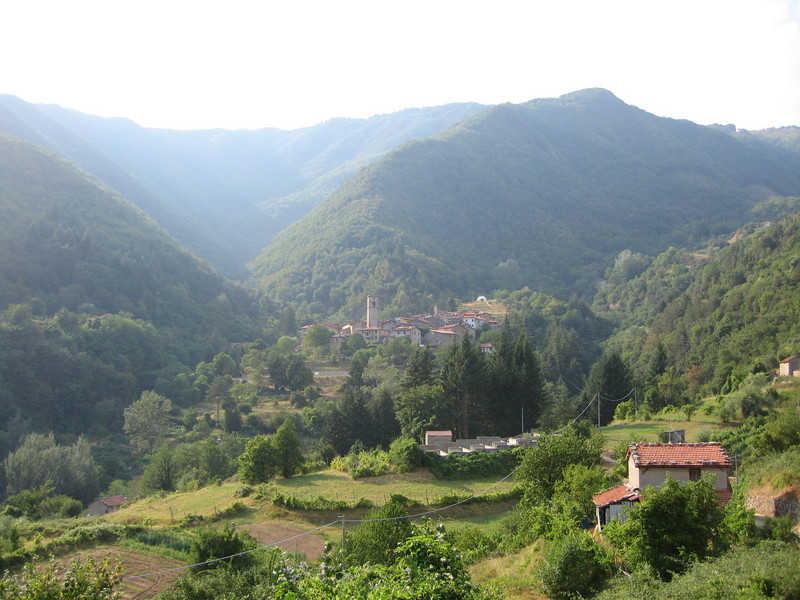|
WORKSHOP ANNOUNCEMENT
Quantum Monte Carlo in the Apuan Alps VIII
QMC versus density functional theory

Sat 27th July - Sat 3rd August 2013
The Apuan Alps Centre for Physics @ TTI
Vallico Sotto, Tuscany, Italy
POSTER
Conference programme
Continuing the series of alternative and very informal meetings at this venue,
the Cambridge University Theory of Condensed Matter group is organizing an
eighth International Workshop to discuss the development and application of the
continuum quantum Monte Carlo (QMC) method and related topics such as density
functional theory (DFT) in condensed matter physics and quantum chemistry. The
conference will take place in our 15th Century monastery in the mediaeval high
mountain village of Vallico Sotto (in the Tuscan Apuan Alps near the beautiful
Italian city of Lucca).
For many types of problem the accuracy of QMC is much better than that of the
more widely-used DFT, and its scaling with number of atoms is much more
favourable than that of high-level quantum chemistry. Unlike most other
methods, it is also fully capable of exploiting the full power of the largest
computers in the world (e.g. the Cambridge CASINO code has been shown to have
almost perfect parallel scaling to over 100,000 CPU cores). All topics related
to applications of QMC and/or theory and algorithm development will be welcome,
though it is expected that broader topics in the general area will also be
discussed.
This year's meeting also has a special theme, concentrating on the relationship
between QMC and density functional theory. In particular, we hope to look
towards obtaining a better understanding of the relative benefits of QMC/DFT in
systems and situations where DFT often fails, such as in weakly-interacting
systems, strongly-correlated materials, metal-insulator transitions, magnetic
properties, and biological systems. Furthermore, it is intended to look into
the better integration of DFT and QMC codes. In industrial applications, where
users typically require ease-of-use and a graphical user interface, how can we
move towards a situation where the user may do e.g. pre-screening of candidate
structures with the faster DFT, then press a `Make the Answer Better button'
which feeds the relevant wave function files into a QMC programme and spits out
reliably accurate energetics for the selected problems. It is also if interest
to understand how to `move the atoms' in QMC i.e. how to exploit the power of
QMC in cheaper DFT and classical-force-field molecular dynamics calculations
(in the context of `embedding methods' or otherwise). Additionally we can look
at how to use QMC to develop better exchange-correlation functionals for use in
DFT. Given the special nature of the meeting, we therefore warmly encourage
applications to attend from DFT people who may never have a run a QMC
simulation in their lives but are nevertheless interested in the topic.
Suggestions for alternative discussion topics and other proposals are welcome.
The normal format for events at the Apuan Alps Centre for Physics involves
formal presentations being restricted to the mornings, with the afternoons left
free for relaxed discussion and participation in activities. For the young and
vigorous, we organize mountain walks, caving and other healthy outdoor
exercise, whilst the unfit and elderly might enjoy artistic tours, city visits,
and gentle country strolls, with all participants reuniting in the evening for
relaxed Tuscan dinners in local restaurants. The monastery is a unique venue
where the community spirit and magnificent location have inspired memorable
meetings in the past.
This year's workshop will involve up to 50 people, all accommodated on
site and in the village. Many speakers will be specifically invited, but
anyone who feels that they have something to contribute and who wishes to
attend the event is most welcome to contact the organizer (Mike Towler:
mdt26 at cam.ac.uk) for further details. There is no charge either for
attendance at the conference or accommodation. A provisional programmme
is available at the above website.
Confirmed participants
Dario Alfè (University College London, U.K.)
Alberto Ambrosetti (Fritz-Haber-Institut, Berlin, Germany)
Sam Azadi (Imperial College, London, U.K.)
Anouar Benali (Argonne National Lab, U.S.A.)
Dario Bressanini (Università dell'Insubria, Italy)
Pascal Bugnion (University of Cambridge, U.K.)
Mauro Causà (University of Napoli, Italy)
Gareth Conduit (University of Cambridge, U.K.)
Mike Deible (University of Pittsburgh, U.S.A.)
Andrea Droghetti (Trinity College, Dublin, Ireland)
Neil Drummond (University of Lancaster, U.K.)
Edgar Engel (University of Cambridge, U.K.)
Elif Ertekin (University of Illinois, U.S.A.)
Matthew Foulkes (Imperial College London, U.K.)
Mike Gillan (University College London, U.K.)
Richard Hennig (Cornell University, U.S.A.)
Kenta Hongo (JAIST, Japan)
Ken Jordan (University of Pittsburgh, U.S.A.)
Jonathan Lloyd-Williams (University of Cambridge, U.K.)
Pierre-Francois Loos (Australian National University, Canberra, Australia)
Matthew Lyle (University of Cambridge, U.K.)
Martin Krupicka (Max Planck Institute, Mulheim)
Ryo Maezono (JAIST, Japan)
Natalia Matveeva (University of Trento, Italy)
Bartomeu Monserrat-Sanchez (University of Cambridge, U.K.)
Elaheh Mostaani (University of Lancaster, U.K.)
Tim Mueller (John Hopkins University, Baltimore, U.S.A.)
Richard Needs (University of Cambridge, U.K.)
Joshua Schiller (University of Illinois, U.S.A.)
Luke Shulenburger (Sandia National Laboratory, U.S.A.)
James Spencer (Imperial College, London, U.K.)
Jian Sun (University of Cambridge, U.K.)
Alex Thom (University of Cambridge, U.K.)
Alexandre Tkatchenko (Fritz-Haber-Institut, Berlin, Germany)
Mike Towler (University of Cambridge and University College, London, U.K.)
Peter Townsend (University of Cambridge, U.K.)
Tack Uyeda (JAIST, Japan)
William Vigor (Imperial College, London, U.K.)
Anatole von Lilienfeld (Argonne National Lab, U.S.A.)
Lucas Wagner (University of Illinois, U.S.A.)
FURTHER DETAILS AND PHOTOS FROM PREVIOUS WORKSHOPS ACCESSIBLE ON TTI WEB PAGE - CLICK THE 'PUBLIC EVENTS' LINK OR LOOK AT 'EVENT PHOTOS'.
|



